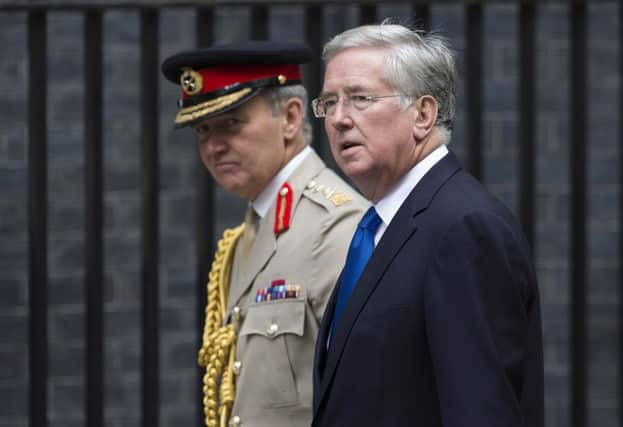Cameron insists attack on IS ‘would be legal’


MPs are expected to question ministers in the Commons today before a vote on RAF strikes against Islamic State (IS), which has seized control of parts of Iraq and Syria.
The legal case was published alongside a parliamentary motion calling for military action, which is expected to be backed by the vast majority of Conservative, Labour and Liberal Democrat MPs.
Advertisement
Hide AdAdvertisement
Hide AdThe SNP was last night refusing to confirm how its MPs would vote, but Nationalist backing looked probable after a Scottish Government spokeswoman said: “Any action taken in Iraq must be in accordance with international law and, in that respect, we note the request for assistance made to the UK by the government of Iraq.” She added: “Any escalation or committing of troops would require further parliamentary consent.”
Six RAF Tornado jets based at Akrotiri in Cyprus are likely to be in action within hours of the vote, joining a US-led coalition that includes France, Saudi Arabia and Gulf states.
The summary of the government’s legal position argued that the Iraqi government’s request for British military assistance “provides a clear and unequivocal legal basis for deployment of UK forces”.
Its publication was a signal that Mr Cameron is anxious not to repeat past errors. In particular, the Prime Minister wants to avoid accusations of illegality that proved so controversial when Tony Blair went to war in Iraq in 2003.
On the eve of the vote, the teenage daughter of the Scottish hostage David Haines, who was beheaded by the terrorists, last night made an emotional appearance on ITV News.
When asked what message she wanted to send to MPs, Bethany Haines said: “IS need to be eradicated. They can’t continue this. If air strikes and ground force is what it takes, that’s what it takes.”
MPs return to the Commons amid claims from Iraq’s prime minister Haider al-Abadi that his country’s intelligence operation had uncovered a plot for an imminent attack on subway systems in the US and Paris.
In a conversation with journalists at the United Nations in New York, he said he was told of the plot yesterday and that it was the work of IS foreign fighters.
Advertisement
Hide AdAdvertisement
Hide AdMr Cameron flew back from the UN meeting to discuss the situation, which saw the recall of parliament, with his Cabinet.
The motion text states that troops will not be deployed in “ground combat operations” against IS. It also makes clear that another vote will be called if the campaign is to be extended to Syria.
The legal summary argues that the action is permissible because Iraq has requested military help to protect its “people and territory”.
Defence Secretary Michael Fallon has suggested that the campaign against IS could be a “long haul” of “two to three years”. He told the House magazine: “We have to face up to this. This kind of extremism has been spreading, taking root in democracies.”
The Cabinet meeting yesterday was briefed by the Chief of the Defence Staff, General Sir Nicholas Houghton, and representatives from the security agencies.
The Prime Minister’s official spokesman said there had been strong support for Mr Cameron’s position, after he warned at the UN that Britain must not fail to take on the “psychopathic” jihadis of IS because it is “frozen with fear” about repeating the mistakes of the Iraq war.
There was said to have been “unanimous” agreement after contributions from Deputy Prime Minister Nick Clegg, Foreign Secretary Philip Hammond, Mr Fallon and Attorney General Jeremy Wright, among others.
The UK is expected to join the US-led international air campaign within days. However, the bombing may not prove that intense because IS is understood to have relatively limited numbers of fixed positions that can be attacked.
Advertisement
Hide AdAdvertisement
Hide AdThe Cabinet is said to have noted the “clear and present danger” that IS poses to security in the UK.
Mr Cameron has deliberately restricted Britain’s involvement to Iraq in part to secure the support of Labour, which has raised concerns about extending air raids into Syria without specific authorisation by the United Nations Security Council.
The Prime Minister is desperate not to see a repeat of last year’s Commons vote on military action, when Labour joined with Conservative rebels to inflict a damaging defeat on the government.
Unlike Iraq – where Britain is acting at the request of the government in Baghdad – there has been no such request from the Syrian regime.
Last night, however, some MPs urged caution over action in Iraq. John Baron, a leading Tory rebel in last year’s vote, said: “Most accept that air strikes alone will not destroy or defeat IS, as we have already seen. So what is plan B regarding regional ground forces?
“Without the Iraqi army taking and holding ground, airstrikes alone could prove ineffective and, at worse, counter-productive.”